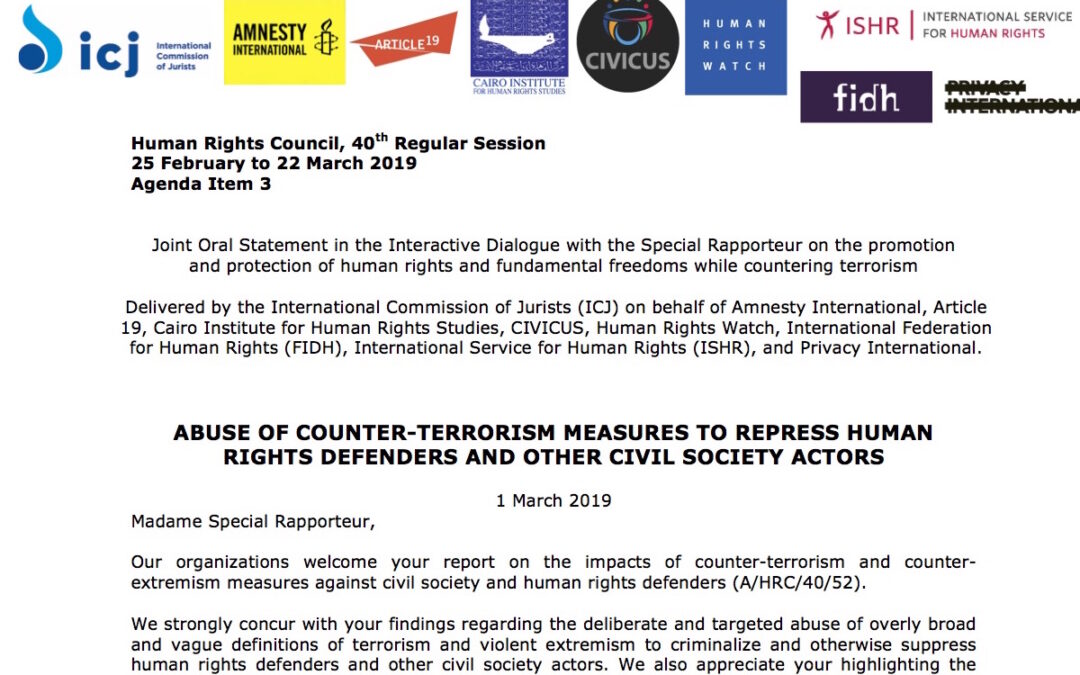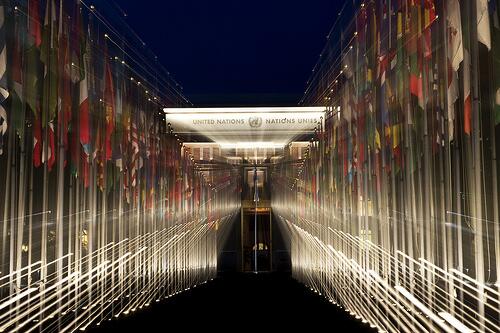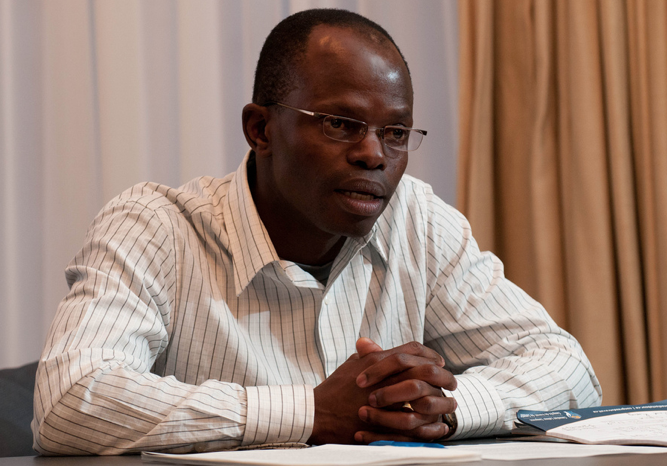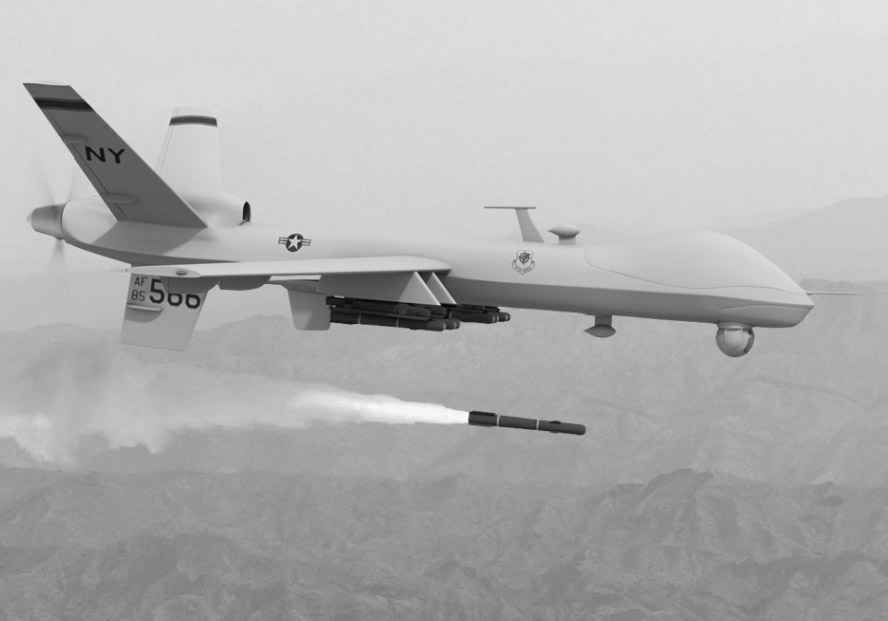
Mar 1, 2019 | Advocacy, Non-legal submissions
The ICJ today delivered a joint oral statement to the UN Human Rights Council, addressing the abuse of counter-terrorism measures to repress human rights defenders and other civil society actors, and highlighting deep concerns about possible moves to allow Egypt a significant role over the UN’s independent expert on human rights and counter-terrorism.
The statement was delivered in an interactive dialogue with the UN Special Rapporteur on the promotion and protection of human rights and fundamental freedoms while countering terrorism. The ICJ made the statement jointly on behalf of Amnesty International, Article 19, Cairo Institute for Human Rights Studies, CIVICUS, Human Rights Watch, International Federation for Human Rights (FIDH), International Service for Human Rights (ISHR), and Privacy International.
The organisations had earlier sent a joint letter to all States’ delegations to the Council in Geneva, highlighting Egypts appalling record of abuse of counter-terrorism measures, and urging States to strongly oppose any attempts to weaken the mandate of the Special Rapporteur, whether by diluting or distorting it by importing the flawed Egyptian-led approach into the Mexican-led resolution for its renewal, or any moves by longstanding leader Mexico to share co-leadership of the mandate renewal resolution with Egypt or other States with such an appalling record in relation to the very issues the mandate is to address.
The joint oral statement to the Council read as follows (check against delivery):
“Madame Special Rapporteur,
Our organizations welcome your report on the impacts of counter-terrorism and counter-extremism measures against civil society and human rights defenders (A/HRC/40/52).
We strongly concur with your findings regarding the deliberate and targeted abuse of overly broad and vague definitions of terrorism and violent extremism to criminalize and otherwise suppress human rights defenders and other civil society actors. We also appreciate your highlighting the need to prevent indirect impacts on civil society.
Among those States with a particularly appalling record of deliberate and targeted abuse, Egypt, which is mentioned in your report (paras 53 and 56), is a prominent example. As Human Rights Watch recently stated: “Using counterterrorism as a guise to crush all forms of dissent could be Egypt’s hallmark of 2018… There’s simply not much room left to peacefully challenge the government without being detained and unfairly prosecuted as a ‘terrorist’.”[1] Other examples from the reports before the Council include Turkey (para 53), Saudi Arabia (A/HRC/40/52/Add.2 paras 21-29), and China particularly as regards Uyghurs and Kazakhs (paras 55 and 57).
We share your concern about the elements lost from the previous Human Rights Council and General Assembly resolutions on “protection of human rights and fundamental freedoms while countering terrorism” in their March 2018 merger with the deeply flawed Egyptian-led initiative on “effects of terrorism” (para 29). We reiterate our call from March 2018 for future versions of the resolution to address the relevant issues exclusively and comprehensively from the perspective of the effective protection of human rights.[2] We strongly oppose any attempts to dilute your mandate, including by importing the flawed Egyptian-led approach into the resolution for its renewal, or any sharing of co-leadership of the mandate renewal resolution with States that have such an appalling record in relation to the very issues the mandate is to address.
Madame Rapporteur, beyond the particular cases mentioned in your report (para 53), what are your views on the broader situation within Egypt in terms of abuse of counter-terrorism measures and what can States, the United Nations, civil society, and other stakeholders do to stop such abuses in the name of counter-terrorism in Egypt and other egregious situations?
Thank you.
[1] https://www.hrw.org/news/2019/01/17/egypt-new-moves-crush-dissent (17 January 2019). See also among others: Human Rights Watch World Report 2019, https://www.hrw.org/world-report/2019/country-chapters/egypt; EuroMed Rights, Egypt – Finding Scapegoats: Crackdown on Human Rights Defenders and Freedoms in the Name of Counter-terrorism and Security (Feb 2018) https://euromedrights.org/wp-content/uploads/2018/03/EuroMed-Rights-Report-on-Counter-terrorism-and-Human-Rights.pdf; Joint NGO Statement, Egypt: Civil society faces existential threat (23 June 2016) https://www.icj.org/wp-content/uploads/2016/06/Egypt-Advocacy-JointNGOStatement-2016.pdf.
[2] Joint NGO end-of-session statement (23 March 2018) https://www.icj.org/hrc37-endofsession/.”
The statement can be downloaded in PDF format here: HRC40-JointOralStatement-SRCTHR-2019-EN
For more information email un(a)icj.org.

Mar 10, 2016 | Advocacy, Non-legal submissions
The ICJ today delivered an oral statement on counter-terrorism legislation in these countries, in an interactive dialogue at the UN Human Rights Council with the the Special Rapporteur on the promotion and protection of human rights and fundamental freedoms while countering terrorism.
The text of the statement follows:
COUNTER-TERRORISM LEGISLATION IN EGYPT, TUNISIA AND PAKISTAN
10 March 2016
Mr President,
The International Commission of Jurists (ICJ) welcomes the attention given by Special Rapporteur Ben Emmerson, to defective counter-terrorism legislation that facilitates violations of human rights, as reflected for example by communications on Egypt, Tunisia and Pakistan in the Communications Report of Special Procedures (A/HRC/31/79).
Numerous counter terrorism laws promulgated or applied in these and other countries include overly broad or imprecise definitions of terrorism-related offences. These extend the laws’ reach beyond acts of a truly terrorist character. Such laws can be and are abused or misapplied to criminalize the legitimate and peaceful exercise of fundamental rights and freedoms.
Further, these laws provide sweeping immunities that contribute to pervasive impunity for unlawful killings by security forces.
These laws also facilitate violations of the right to liberty and fair trial rights and insufficiently safeguard against abuses in detention. In Tunisia a person can be held in police custody without being brought before a judge for up to 15 days. In Pakistan, suspects can be held in preventive detention without charge, and without being brought before a judge, for up to 90 days.
Egypt and Pakistan continue to use military courts to conduct unfair trials of civilians in terrorism cases, contrary to international standards. At least eight civilians sentenced to death in secretive trials by military courts in Pakistan have been hanged since January 2015. “Expedited” procedures in terrorism circuit courts in the Egyptian civilian system also give rise to fair trial concerns.
The ICJ invites the Special Rapporteur to comment on measures or mechanisms that states, inter-governmental organisations, and civil society can take to help ensure that states such as Tunisia, Egypt and Pakistan repeal or amend counter-terrorism legislation to bring it into line with their international human rights obligations and commitments.

Mar 25, 2015 | Advocacy, Open letters
The ICJ today joined other NGOs in an open letter urging States at the UN Human Rights Council not to support a draft resolution on the ‘Effects of Terrorism on the Enjoyment of Human Rights’ in its present form and without substantial amendment.
The letter explains why the draft resolution, presented jointly by Egypt, Jordan, Algeria, Morocco and Saudi Arabia, is significantly unbalanced and suffers from four key and inter-related deficiencies:
First, the draft resolution calls for strengthening of counter-terrorism measures without sufficiently recognising that such laws and measures must be in conformity with international human rights, refugee and humanitarian law and refugee law.
Second, the resolution fails to call on States to ensure that laws and measures on counter-terrorism and national security do not hinder the work and safety of human rights defenders and other civil society actors; and to ensure that such laws and measures clearly identify which offences qualify as terrorist acts by defining transparent and foreseeable criteria.
Third, the text fails to recognise that support for a vibrant and pluralistic civil society and respect for the fundamental rights of freedom of expression, association and assembly are essential to combat extremism, counter terrorism and provide protection, support and justice to victims.
Fourth, while the draft resolution has been presented by the core group as taking a ‘victim-centered’ approach, the text fails to respond to what victims of terrorism have themselves expressed to the Council is needed to respect and fulfill their human rights. To the contrary, the resolution appears to continue the regrettable practice of invoking the suffering victims of terrorism to justify measures that too often are abused to violate human rights, without delivering real justice, remedy, and support to the victims themselves.
In conclusion, the letter urges delegations not to support the draft text without very substantial amendments, and suggests that a preferable approach may be to consider the concerns sought to be addressed in the present text when the Council comes to negotiate its traditional bi-annual resolution on human rights and countering terrorism at its 31st session in March 2016.
The Open Letter is signed jointly by: African Centre for Democracy and Human Rights, Amnesty International, ARTICLE 19, Asian Legal Resource Centre, Cairo Institute for Human Rights Studies, Centro de Estudios Legales y Sociales (CELS), East and Horn of Africa Human Rights Defenders Project, Egyptian Initiative for Personal Rights, FORUM-ASIA, Human Rights House Foundation, Human Rights Watch, International Commission of Jurists, International Federation for Human Rights (FIDH) and International Service for Human Rights.
The full letter may be downloaded in PDF format here: Universal-HRC28-TerrorismHumanRights-Advocacy-OpenLetter-2015-ENG
The draft resolution may be downloaded here: HRC28 Draft Terrorism Human Rights Resolution
Update 26 March 2015: The resolution was adopted, with an oral amendment, by vote of the Council (25 in favour, 16 abstentions, 6 against): Terrorism 2015 vote

Mar 2, 2015 | Events
A major side event at the Human Rights Council, featuring current and former UN Special Rapporteurs together with human rights defenders from Swaziland and Zimbabwe, will discuss national security and human rights defenders, on 10 March.
The ICJ joins Article 19, FIDH, ISHR, and OMCT, in supporting the side event.
The panel discussion will feature:
- Michel Forst, UN Special Rapporteur on Human Rights Defenders
- Tanele Maseko, campaigner for the release of her detained husband, Swaziland lawyer Thulani Maseko (pictured – see recent submission on his case here)
- Jimena Reyes, Director of Americas Desk, FIDH
- Hina Jilani, Pakistani human rights lawyer and former UN Special Representative on Human Rights Defenders (and member of the ICJ Executive Committee)
- Roselyn Hanzi, Zimbabwe Lawyers for Human Rights
- Gerald Staberock, Director, World Organisation against Torture
The side event will take place Tuesday, 10 March, from 15h00 to 16h30, at Palais des Nations, Geneva, Room XI.

Mar 12, 2014 | Advocacy, Non-legal submissions
The ICJ prepared an oral statement to the UN Human Rights Council in response to a report on armed drones presented to the Council by the UN Special Rapporteur on human rights while countering terrorism, Ben Emmerson, on 11 March 2014.
The ICJ expressed appreciation at the focus of the report on the use of remotely piloted aircraft in counter-terrorism operations, and particularly with the Special Rapporteur’s assessment that the single greatest obstacle to an evaluation of the impact of drone strikes is lack of transparency. Lack of transparency creates an accountability vacuum and prevents effective access to justice.
In addition to sources of a legal obligation of transparency, the ICJ refers to the Tshwane Global Principles on National Security and the Right to Information.
The ICJ stressed that a number of attacks documented in the report occurred outside of the context of any armed conflict, and thus were fully subject to international human rights law with no role for the special and potentially more permissive rules of international human applicable in situations of armed conflict.
The ICJ agreed a number of points raised in the report of the Special Rapporteur were matters of controversy between states, but at the same time recalled that a lack of consensus did not necessarily mean that international law did not already provide definite answers to the issues.
The ICJ further suggested that principles and guidelines on the use of remotely piloted aircraft in counter-terrorism operations should be based on legal analysis, framed from the perspective of ensuring States’ compliance with international law; and justice and redress for victims of human rights violations and/or violations under international humanitarian law.
Due to the very limited time allocated to non-governmental organisations during the Interactive Dialogue on the Report, the ICJ was not able actually to read out its oral statement, but is making it public and has communicated its contents to the Special Rapporteur.
The oral statement can be downloaded in PDF here: ICJ-HRC25-SRCT-OralStatement-Drones.
The Report by the Special Rapporteur is available here.
For further information please contact: Mr Alex Conte (alex.conte(a)icj.org), ICJ International Law and Protection Programmes









